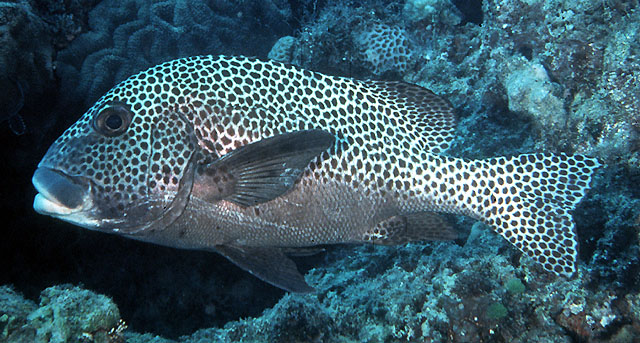| Haemulidae (Grunts), subfamily: Plectorhinchinae |
| 72 cm TL (male/unsexed); max.weight: 7,000.0 g |
|
reef-associated; depth range 1 - 30 m |
| Indian Ocean: Maldives (Ref. 11303) and Cocos Islands (Ref. 9399). Western Pacific: Sumatra to Fiji (Ref. 9710) and New Caledonia, north to Ryukyu Islands, south to Rowley Shoals. |
|
Dorsal spines (total): 11-12; Dorsal soft rays (total): 18-20; Anal spines: 3-3; Anal soft rays: 7-8. Description: Juveniles brown with large white blotches. Becomes more spotted with age, reversing from white to dark brown spotted in the process. Deeper bodies compared to most others in the genus (Ref. 48635). Lips very thick in adults. Body depth 2.4-2.5 in SL. Caudal fin deeply forked with broadly rounded lobes in juveniles; only slightly forked to emarginate in adults. (Ref. 90102) |
| Inhabits coral-rich areas of clear lagoon and seaward reefs. Adults are solitary, near and under ledges or caves by day. Juveniles are found among corals (Ref. 9710). Feeds on crustaceans, mollusks, and fishes at night. Juveniles are used in the aquarium industry (Ref. 9137). Small juveniles may mimic a toxic flatworm (Ref. 9710). |
|
Not Evaluated
(Ref. 96402)
|
| harmless |
|
Source and more info: www.fishbase.org. For personal, classroom, and other internal use only. Not for publication.
Page created by Jen, 05.08.02,
php script by kbanasihan 06/09/2010 ,
last modified by
dsantos, 20/08/10

